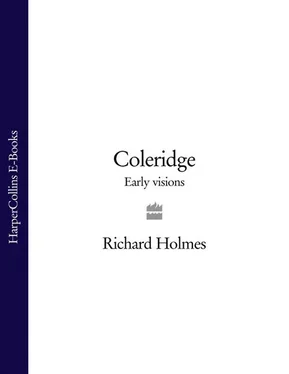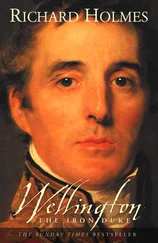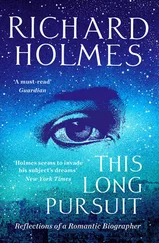The story, told long after to Gillman, describes another of his epic daydreams: he was Leander swimming the Hellespont, and “thrusting his hands before him as in the act of swimming” he inadvertently struck the man’s pocket on the crowded pavement, and to his bewilderment was accused of pick-pocketing. Tearful denials were followed by a vivid, breathless account of his dreaming re-enactment of Leander’s adventures, all in young Coleridge’s most eloquent, large-eyed manner. The gentleman “was so struck and delighted by the novelty of the thing”, that he ended by subscribing him the library ticket. 12
This odd tale, which is certainly strange enough to be true, has something curiously prophetic about it: the daydreaming poet – the sudden interruption – the accusation of (literary) theft – the hypnotic, glittering-eyed explanation. They are all emblems of the future literary man at work. The story also suggests that Coleridge was independent enough in his world of books and dreams to regularly go “skulking”, school slang for breaking bounds.
The King Street Library provided him, for two or three years, with a private larder of delights, to substitute for gifts of food.
I read through the catalogue, folios and all, whether I understood them, or did not understand them, running all risks to go skulking out to get the two volumes which I was entitled to have daily…My whole being was, with eyes closed to every object of present sense, to crumple myself up in a sunny corner, and read, read, read; fancy myself on Robinson Crusoe’s island, finding a mountain of plumb-cake, and eating a room for myself, and then eating it into the shapes of tables and chairs – hunger and fancy! 13
His earliest compositions seem to have been a couple of schoolboy charms, or dog-rhymes against sickness. One was intended to ward off the dreaded “itch” that brought the sulphur treatment. The other was against morning cramps, a rhyming spell to be chanted aloud while making magic cross-marks of spittle on the seized calf muscles, “pressing the foot on the floor, and then repeating this charm with the acts configurative thereupon prescribed”. 14These were his first essays in a long line of poetical incantations.
It was the obsessive reading that first brought him to Bowyer’s fatal attentions, probably in his third year, 1785, in the Grammar School. He was then still under his junior master, the easy-going Mr Field, who had conveniently assumed that he was a daydreaming dunce. Thomas Middleton, the earnest well-meaning scholar, then a Deputy Grecian, found him reading Virgil “for pleasure” in the cloisters, and mentioned this with admiration to the headmaster. Bowyer made enquiries of Field and learned with grim interest that in class the boy was “a dull and inapt scholar” who could not repeat a single rule of syntax. Coleridge was summoned, flogged, and told that he was destined to be a Grecian. Thereafter Coleridge’s dreaming and carelessness “never went unpunished”; and whenever Bowyer beat him he would cruelly add an extra stroke, “for you are such an ugly fellow!”. 15But the gentle Middleton became henceforth Coleridge’s “patron and protector”, a significant friendship which was to continue right through to Cambridge days, and which was remembered gratefully in the Biographia , with an affectionate classical tag from Petronius. 16
Coleridge’s position improved as steadily as he rose out of the most tribal ranks of the junior boys. His waywardness, cleverness, and voluble charm soon made him fast friends with two other future Grecians, Robert Allen and Valentine Le Grice, who shared the attentions of Bowyer. They formed one of those schoolboy triumvirates of contrasted talents: Bob Allen the handsome extrovert, Val Le Grice the mischievous wit, and Sam Coleridge the learned eccentric.
From 1785 he also had two of his brothers within reach in London, as Luke was training at the London Hospital under Sir William Blizard, and George came down from Oxford to teach at Newcome’s Academy in Hackney. Initially it was Luke who exercised the greatest influence, and Coleridge “became wild to be apprenticed to a surgeon”. He launched into medical and anatomy books – “Blanchard’s Medical Dictionary I had nearly by heart” – and trudged off every Saturday to attend dressings and hold plasters at the hospital. Luke’s fellow medical student, the younger brother of Admiral de Saumerez, vividly remembered the “extraordinary, enthusiastic, blue-coat boy” trailing round the wards with his endless questions. 17
Another, more hair-brained, ambition at the age of fifteen was a scheme to apprentice himself to a local shoemaker, largely because the man and his wife had been so kind to him during the lonely “leave-days”. Perhaps this was a serious attempt to escape from Christ’s Hospital early (apprenticeships were, after all, allowed by the statutes), and to flee back into a less demanding, domestic existence. At all events the kindly shoemaker, a Mr Crispin, was sent packing by Bowyer after a ferocious interview – “Crispin might have sustained an action in law against him for an assault” – and Coleridge was flogged again to remind him of his privileged status as a future Grecian. “Against my will,” he recalled mournfully, “I was chosen by my master as one of those destined for the university.” But it is difficult to believe in his reluctance to excel by this stage, and the whole incident may have been one of Coleridge’s self-dramatisations – the prodigy who merely wanted to be a simple cobbler’s son, a thoroughly romantic role. 18
Soon afterwards both shoemaking and medicine gave way to “a rage for metaphysics”. He read Cato on Liberty and Necessity, discovered Voltaire’s Philosophical Dictionary , and announced that he was a theological sceptic. Bowyer proved himself quite equal to this development too: “his argument was short and forcible – ‘So, sirrah, you are an infidel, are you? then I’ll flog your infidelity out of you.’” 19Coleridge often spoke of this as the severest beating of his life, though it is one of the many peculiarities of the Biographia that he afterwards pretended that Bowyer was a paragon of pedagogical justice. This is contradicted by all other records of Christ’s Hospital, even that of its official historian, who implicitly admitted that Bowyer was a sadist. Leigh Hunt quietly recalled that Bowyer not only flogged unmercifully, but picked up boys by their earlobes until they bled, and once threw a copy of Homer at him so hard that it knocked out one of his teeth. Hunt later said that Coleridge admitted all this in private, and “said he dreamt of the master all his life, and that his dreams were horrible”. 20Many Notebook entries confirm this. 21
Coleridge’s genial retrospective attempt to pass off Bowyer’s cruelties in the Biographia is one of the earliest, clear examples of his urge to rewrite his personal history in a comic mode that embraced the authorities he had once rebelled against. This was to show even more sharply in his political reminiscences, where the problem of authority recurs in a different but related form. Yet the deception is a complex one, for Coleridge obviously felt genuinely indebted to Bowyer for the encouragement he was soon to give him as a fledgling poet. The truth seems to be that all his life Coleridge longed to submit to figures of authority, while at the same time he secretly resented many aspects of their domination. Casting himself in a comic role provided a sort of modus vivendi ; yet he could rarely resolve the underlying conflict in his life. He longed to assert himself and give free rein to his enormous, anarchic talents; but at the same time he needed to submit, and be petted and approved of. Throughout his life, and his writing, he fluctuated wildly between these two extremes. Only his dead father, perhaps, ever allowed him to do both.
Читать дальше












